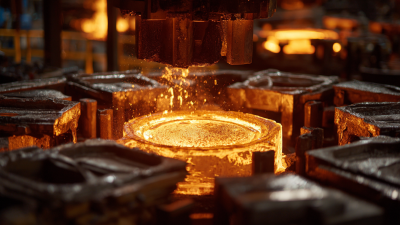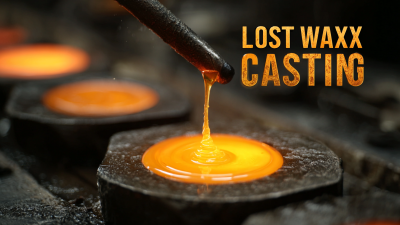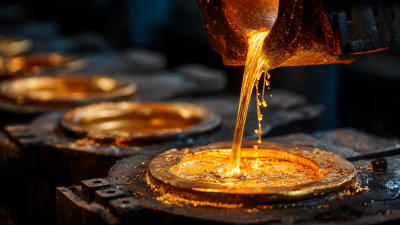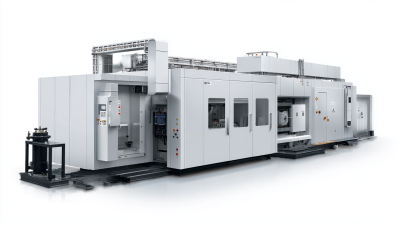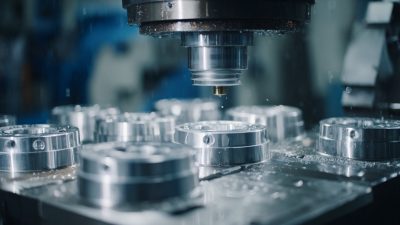In today's rapidly evolving manufacturing industry, the emergence of Copper Precision Casting is redefining traditional methodologies and offering unprecedented advantages. According to a recent report by MarketsandMarkets, the global precision casting market is expected to reach $35 billion by 2025, with copper-based products driving significant growth due to their superior conductivity and durability. This innovative process not only enhances production efficiency but also minimizes material waste, aligning with the industry's increasing emphasis on sustainability. Furthermore, Copper Precision Casting is revolutionizing sectors such as electronics, automotive, and aerospace, where precision and reliability are paramount. As manufacturers seek to leverage advanced techniques to remain competitive in a fast-paced market, the adoption of Copper Precision Casting stands out as a strategic game changer, promising to reshape the future of manufacturing.

The rise of copper precision casting in modern manufacturing is revolutionizing the industry, driven by its unique properties and advantages. As manufacturers seek to enhance efficiency and product performance, copper's superior thermal and electrical conductivity makes it an ideal choice for various applications. Recent market analyses highlight a burgeoning investment in copper alloys, with the U.S. copper alloys for connector market projected to grow from USD 140.3 million in 2024 to an impressive USD 244.6 million by 2033. This surge underscores the increasing reliance on advanced materials to meet the demands of modern technology.
Moreover, the HVLP copper foil market is anticipated to expand from USD 1.45 billion in 2024 to USD 2.8 billion by 2033, reflecting a compound annual growth rate (CAGR) of 8.3%. Such growth signals strong market confidence in copper-based products as they play critical roles in electronics and energy sectors. Additionally, the global copper pipes and tubes market is expected to reach approximately USD 49.8 billion by 2035, indicating a widespread adoption of copper components in sustainable infrastructure projects. These trends not only highlight the versatility of copper precision casting but also its pivotal role in shaping the future of manufacturing.
Copper precision casting is transforming the manufacturing sector with its numerous advantages over traditional casting methods. One significant advantage is its superior dimensional accuracy, which can reach tolerances as tight as ±0.1mm. This precision not only minimizes waste but also reduces the need for costly secondary machining processes. According to a report by Markets and Markets, the global precision casting market is projected to grow from $21.5 billion in 2021 to $29 billion by 2026, highlighting the increasing adoption of precise methodologies across various industries.
Another key benefit is copper's excellent thermal and electrical conductivity, which outperforms that of other metals. This property makes copper precision casting an ideal choice for applications in the electrical and electronics sectors. A study published by the International Journal of Advanced Manufacturing Technology emphasizes that precision casting can achieve up to 95% utilization of raw materials, significantly enhancing production efficiency and sustainability.
**Tip:** For companies looking to streamline their manufacturing processes, investing in copper precision casting can lead to substantial long-term savings. Assess the compatibility of your operations with this advanced method to maximize both productivity and product quality. Moreover, consider collaborating with established casting specialists to leverage their expertise and optimize your production line effectively.

Copper precision casting has emerged as a transformative technology in the manufacturing industry, enabling advancements across various sectors. One of the most significant applications is in the electronics industry, where the superior conductivity of copper enhances the performance and efficiency of components like connectors and circuit boards. As devices become smaller and require more efficient thermal management, copper casting allows for intricate designs that meet the demanding specifications of modern electronics.

In the automotive sector, innovation through copper casting is evident in the production of high-performance engine components and heat exchangers. The ability to produce complex geometries with excellent surface finishes leads to lighter and more efficient parts that contribute to overall vehicle performance and fuel efficiency. Moreover, copper's natural antimicrobial properties are increasingly being utilized in HVAC systems to improve air quality, showcasing the diverse applications of copper casting techniques in enhancing both product functionality and sustainability in manufacturing processes.
The evolution of technology has significantly enhanced the efficiency of copper precision casting, making it a pivotal process in today’s manufacturing landscape. Advanced software solutions and computer-aided design (CAD) systems are enabling manufacturers to create intricate and highly detailed designs with remarkable accuracy. This precision not only minimizes material waste but also allows for quicker production times, ensuring that the finished products meet stringent industry standards.
Moreover, the integration of automation and robotics in the casting process has further streamlined operations. Automated systems can manage the pouring and cooling of molten copper, reducing human error and increasing safety in foundries. With technologies like 3D printing also beginning to play a role in mold creation, manufacturers can quickly iterate designs and produce custom components more efficiently than ever before. As a result, companies can respond more rapidly to market demands and foster innovation in product development, solidifying copper precision casting's status as a game changer in manufacturing.
| Technology | Impact on Efficiency | Reduction in Waste (%) | Time Savings (Hours) | Cost Reduction (% of Total) |
|---|---|---|---|---|
| 3D Printing | Increases design flexibility and reduces production time | 30 | 10 | 20 |
| Automated Casting | Enhances precision and consistency in casting | 25 | 15 | 15 |
| Simulation Software | Improves design through testing and optimization | 20 | 5 | 10 |
| Robotics | Speeds up material handling and increases safety | 40 | 12 | 25 |
| Quality Control Systems | Ensures higher product standards and fewer defects | 35 | 8 | 5 |
Copper precision casting is increasingly recognized as a pivotal element in the transition towards sustainable manufacturing practices. Given its remarkable properties, such as exceptional thermal conductivity and corrosion resistance, copper is becoming a preferred material across various industries. According to recent research, the global metal powder market is projected to exceed $14.9 billion by 2034, reflecting the growing demand for high-quality metals like copper in advanced manufacturing processes.
In France, companies are actively investing to enhance copper production and recycling capabilities, aligning with the broader trend of sustainable material usage. The strategic focus on recycling not only minimizes waste but also reduces the carbon footprint associated with new copper extraction. Furthermore, studies indicate that copper's longevity and recyclability make it an ideal candidate for eco-friendly manufacturing solutions. As industries aim for lower environmental impacts, copper precision casting stands out as a game-changer, offering both performance benefits and sustainability advantages.
